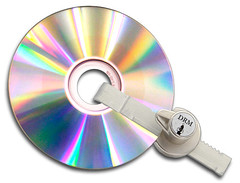DECE seeks complex DRM that approximates the simple first-sale doctrine that consumers expect
By Kristopher A. Nelson
in
January 2010
600 words / 3 min.
Tweet
Share
Consumer electronics manufacturers and Hollywood studios have a problem: when customers purchase a movie online, they expect to be able to watch it anywhere – but, thanks to DRM, they can’t easily do it (unless they bought a physical DVD and rip it, or otherwise remove the DRM, which is what Hollywood is desperate to prevent). The DECE wants to change that.
Please note that this post is from 2010. Evaluate with care and in light of later events.
 Consumer electronics manufacturers and Hollywood studios have a problem: when customers purchase a movie online, they expect to be able to watch it anywhere — but, thanks to Digital Rights Management (DRM), they can’t easily do it (unless they bought a physical DVD and rip it, or otherwise remove the DRM, which is what Hollywood is desperate to prevent). The Digital Entertainment Content Ecosystem (DECE) wants to change that:
Consumer electronics manufacturers and Hollywood studios have a problem: when customers purchase a movie online, they expect to be able to watch it anywhere — but, thanks to Digital Rights Management (DRM), they can’t easily do it (unless they bought a physical DVD and rip it, or otherwise remove the DRM, which is what Hollywood is desperate to prevent). The Digital Entertainment Content Ecosystem (DECE) wants to change that:
The group is setting out to create a common digital standard that would let consumers buy or rent a digital video once and then play it on any device. It might sound technical, but it could be crucial to persuading consumers to buy all the splashy new Internet-connected gear that tech companies will demonstrate at C.E.S., like HDTVs and set-top boxes that can download TV shows and films.
via Hollywood and Technology Companies Work to Make Digital Video Portable – NYTimes.com. (For a more customer-focused discussion, see DECE’s Plans for Digital Movie Purchases May Confuse and Anger You – Downloads – Gizmodo.)
Of course, we already have common digital standards that allow exactly this. What we don’t have is a common system that implements shared restrictions (DRM) and allows Hollywood to specify what you can (or, more usually, can’t) do with the product you purchased on all your devices.
To a consumer — me, for example — buying media with DRM that limits what I can do through technological and contractual restrictions feels an awful lot like renting that media. Why should I spend extra to “buy” something that won’t let me use it to the maximum extent provided by law? Sure, I don’t expect to be able to make copies and sell them, but I do expect to be able to fully utilize what I purchase: sell it, play it when and how I like, and so on.
This intuitive expectation by consumers has a legal concept associated with it: first sale. That doctrine, which applies to most of what a regular person has been purchasing for years, cuts off the ability of the original seller to determine what happens next in the stream of commerce. I can sell my new purchase, destroy it, rent it, take it apart, and so on. I can’t necessarily copy it (at least, not if patent protection exists, or copyright applies), but I can pretty much do what I want with it. This is why CD resale stores exist, why Netflix can mail you DVDs in a day, and why Craigslist (and newspaper classifieds) can exist. It is what customers have come to expect from the products they purchase.
But it isn’t what they get from movies purchased online (or from e-books, for that matter) or often from music either (although Apple and others have finally pushed back enough to remove DRM from most music — perhaps this is a lesson for Hollywood?). Instead, content owners (who may or may not be creators or producers) want to “license” your access to media, and to stick DRM on to limit what you can do with it — but they still want you to pay them the same amount as if you were purchasing something that gave you full first-sale rights. And then they wonder why consumers balk?
I don’t mind paying a small amount to “rent” (I know roughly what that means) limited-use media. But if I buy something, I want to own it, and I want full first-sale rights to it, not some technological restriction that artificially limits my use (and tends to break across manufacturers and over time).
